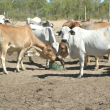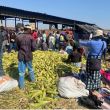CLIMATE-INDUCED droughts, soil degradation, and fragmented value chains threaten agriculture sector progress but transformative technologies could be useful to minimise these challenges.
Lands, Agriculture, Fisheries, Water and Rural Development Ministry Permanent Secretary, Professor Obert Jiri told researchers, extension officers, farmers, development partners, government representatives and the private sector at the opening session of the 2nd Agriculture Research and Extension Symposium, that equipping smallholder farmers, who are the backbone of the country’s food systems, with AI-driven apps could be a key factor in driving the Agriculture, Food Systems and Rural Transformation Strategy (AFSRTS).
“Let us scale up these tools through partnerships to ensure rural connectivity. Agricultural research is the key to unlocking solutions to these challenges. By investing in research, we can develop new technologies, practices, and policies that improve crop yields, enhance food security, and promote sustainable agriculture,” said Prof Jiri.
“Zimbabwe’s maize yields remain vulnerable to droughts and fall armyworm. Yet, breakthroughs including drought-tolerant ZAP maize hybrids, pioneered by our national research institutes, offer hope. Similarly, biofortified crops such as iron-rich beans and vitamin A sweet potatoes—already adopted in Gutu and Chimanimani—are combating malnutrition.
“Let us accelerate ethical biotech adoption, ensuring farmers access to certified seeds through streamlined subsidies and agro-dealer networks.”

The symposium was held under the theme: “Transformative Agricultural Technologies Accelerating the Attainment of Vision 2030.”
The Ministry of Lands, Agriculture, Fisheries, Water and Rural Development supports research, innovation, and development through several research institutes under the Directorate of Research, Innovation and Specialist Services (ARISS), Department of Veterinary Services, Water Resources, Irrigation Development and WASH, as well as Agricultural Engineering, Mechanization and Soil Conservation Department.
These institutions provide research-based technologies and technical information for advisory services and research products supporting enhanced agricultural productivity and production of both crops and livestock.
The Ministry collaborates with CGIARs including CIMMYT on maize and wheat, ICRISAT on traditional grains and legumes (sorghum, millets, groundnuts etc), ICARDA on wheat as well as CIAT on beans.
“Let’s harness the power of science and technology to build a more sustainable future for all. By doing so, we can ensure that agriculture continues to be a driving force for economic growth, food security, and sustainable development,” said Prof Jiri.











